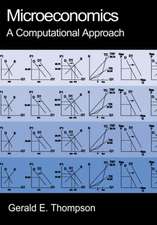Legal Orderings and Economic Institutions: Routledge Siena Studies in Political Economy
Autor Fabrizio Cafaggi, Antonio Nicita, Ugo Paganoen Limba Engleză Paperback – 9 dec 2015
The contributions to this volume encompass some of the core controversial issues in law and economics arising from interactions between legal orderings and economic institutions. They include:
- the nature of institutional and legislative change and the emergence of strong institutional complementarity in legal positions
- the relationship between private orderings and the role of the State in enforcing contracts and defining property rights
- the nature and dynamics of endogenous enforcement and
- the analysis of governance models and corporate ethics.
| Toate formatele și edițiile | Preț | Express |
|---|---|---|
| Paperback (1) | 416.22 lei 6-8 săpt. | |
| Taylor & Francis – 9 dec 2015 | 416.22 lei 6-8 săpt. | |
| Hardback (1) | 1116.27 lei 6-8 săpt. | |
| Taylor & Francis – 3 mai 2007 | 1116.27 lei 6-8 săpt. |
Din seria Routledge Siena Studies in Political Economy
- 16%
 Preț: 248.79 lei
Preț: 248.79 lei -
 Preț: 480.89 lei
Preț: 480.89 lei -
 Preț: 491.01 lei
Preț: 491.01 lei -
 Preț: 329.54 lei
Preț: 329.54 lei -
 Preț: 429.71 lei
Preț: 429.71 lei -
 Preț: 416.22 lei
Preț: 416.22 lei -
 Preț: 419.92 lei
Preț: 419.92 lei -
 Preț: 416.22 lei
Preț: 416.22 lei
Preț: 416.22 lei
Nou
Puncte Express: 624
Preț estimativ în valută:
79.64€ • 82.99$ • 65.94£
79.64€ • 82.99$ • 65.94£
Carte tipărită la comandă
Livrare economică 03-17 aprilie
Preluare comenzi: 021 569.72.76
Specificații
ISBN-13: 9781138806245
ISBN-10: 1138806242
Pagini: 380
Ilustrații: 27 Line drawings, black and white; 8 Tables, black and white; 27 Illustrations, black and white
Dimensiuni: 156 x 234 x 20 mm
Greutate: 0.45 kg
Ediția:1
Editura: Taylor & Francis
Colecția Routledge
Seria Routledge Siena Studies in Political Economy
Locul publicării:Oxford, United Kingdom
ISBN-10: 1138806242
Pagini: 380
Ilustrații: 27 Line drawings, black and white; 8 Tables, black and white; 27 Illustrations, black and white
Dimensiuni: 156 x 234 x 20 mm
Greutate: 0.45 kg
Ediția:1
Editura: Taylor & Francis
Colecția Routledge
Seria Routledge Siena Studies in Political Economy
Locul publicării:Oxford, United Kingdom
Public țintă
Postgraduate and ProfessionalCuprins
Introduction 1. Law, Economics and Institutional Complexity: An Introduction Part 1: Complexity in Law and Economics 2. Economics in the Future of the Law 3. Law and Economics in Historic Perspective 4. Legal Positions and Institutional Complementarities 5. Legislate Today or Wait Until Tomorrow?: An Investment Approach to Lawmaking Part 2: Private Orderings, Efficiency and the Role of the State 6. The Enforcement of Contracts and the Role of the State 7. Minimal Liberty and the ‘Coasean Liberal’: Setting Boundaries and Complementarities betweenthe State and the Market 8. Private Orderings and Intellectual Property: What is it the Best Incentive System? 9. Fairness and Welfare: are they Really Competing Values? Part 3: Contractual Incompleteness and the Nature of Endogenous Enforcement 10. Costly Contingent Contracts: A Failure of the Coase Theorem 11. Game-Theoretic Solutions to Endogenous Contractual Incompleteness 12.Customary Contracts 13.Group Relations and Industrial Districts Part 4: Governance Models and Corporate Ethics 14. What is a Corporation?: The Corporate Personality Controversy and Comparative Corporate Governance 15. Fiduciary Duties, Models of Firms and Organizational Theories in the Context of RelationalInterdependencies 16. Incomplete Contracts and Corporate Ethics: A Game Theoretical Model under Fuzzy Information
Notă biografică
Fabrizio Cafaggi, Antonio Nicita, Ugo Pagano
Descriere
This book addresses the lively interaction between the disciplines of law and economics. The contributions encompass some of the core controversial issues in the disciplines arising from interactions between legal orderings and economic institutions.




















